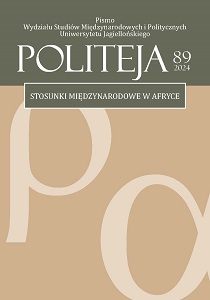Problem państw de facto w stosunkach międzynarodowych w okresie dekolonizacji w Afryce
The Problem of de facto States in International Relations during the Decolonisation in Africa: The Case of Katanga and South Kasai
Author(s): Robert KłosowiczSubject(s): Politics, Political Theory, International relations/trade, Developing nations
Published by: KSIĘGARNIA AKADEMICKA Sp. z o.o.
Keywords: foreign policy; Congo; Katanga; South Kasai; de facto states;
Summary/Abstract: In modern history of Sub-Saharan Africa there have been several attempts of secession, most of which failed. Some of them were successful, such as Eritrea or South Sudan, others were close to success, such as Katanga in the Belgian Congo or Biafra in Nigeria, and some others never had any practical chances of success, such as Cabinda, aiming to separate from Angola, or South Kasai from Congo. The Republic of Congo, one of the largest countries in Sub-Saharan Africa, was the first of the independent states in this region to experience civil war and separatism. This former Belgian colony gained independence on 30 June 1960 and was plunged into an internal conflict just two weeks later. The military rebellion and the chaos that arose in the country after the declaration of independence were used by politicians from the mineral-rich Katanga and South Kasai provinces. The conflict, taking place in the realities of the Cold War and decolonisation, became an element of a larger international game between the Western world, the Eastern bloc, and non-aligned countries. Katanga is the only example so far when the international community has made an effort towards ending secession of an unrecognised state and has tried to restore state unity using military force through the United Nations. The aim of the article is to analyse the political situation and assess the chances for the real existence of Katanga and South Kasai from the nowadays perspective of 60 years after these events. In the light of the documents concerning the Congo crisis that have been disclosed in recent years, the author argues that Katanga did not gain independence because it was a product of the Cold War, but because it expressed its aspirations in the realities of the bipolar division of the world.
Journal: Politeja - Pismo Wydziału Studiów Międzynarodowych i Politycznych Uniwersytetu Jagiellońskiego
- Issue Year: 21/2024
- Issue No: 89/2
- Page Range: 5-28
- Page Count: 24
- Language: Polish

